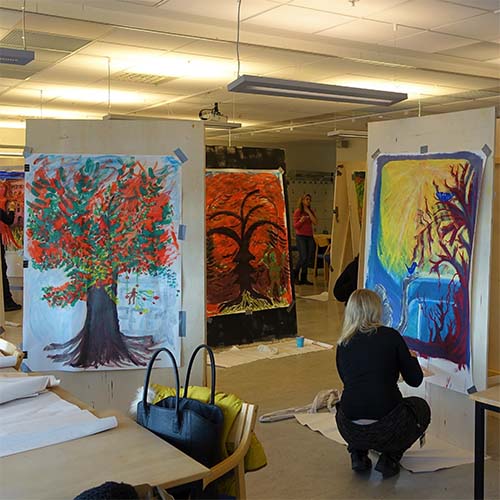Arts-based learning in the development of vocational skills
Experiences from studies at Vocational Teacher Education, Oslo Metropolitan University
DOI:
https://doi.org/10.7577/sjvd.3423Keywords:
arts-based learning, life skills, vocational education, working identity, creativityAbstract
There is a need to develop an extended set of competences in the school of the future (NOU, 2014: 7, 2015: 8). This article examines how arts-based learning can enhance professional and vocational skills. It explores whether this way of learning can strengthen the connection between education and working life, develop creativity, cultivate life skills, professional identity and character.
We address and clarify the historical division between art and working life and presents theories that explain how subjectivity and personal development processes may be improved. Principles from confluent pedagogy are used to actualise how arts-based learning may contribute to the professional field.
The data obtained is from the period 2009 to 2015. The material, based on experiences and results from five different courses in Creative Communication, and three classes of students at a three-year bachelor's degree program in Design and Crafts, is from the Department of Vocational Teacher Education at Oslo Metropolitan University.
The article summarises how art-based learning may reinstate the role of the arts in the professional field of expertise and represent an essential part in the development of vocational competences. It suggests trying out and giving room to different forms of arts-based learning at all levels of education.
Downloads

Downloads
Published
How to Cite
Issue
Section
License
Copyright (c) 2019 Cecilie Meltzer, Eva Schwencke

This work is licensed under a Creative Commons Attribution 4.0 International License.
Authors who publish in SJVD accept the following terms:
- The author(s) retain copyright and gives the journal the right to the first publication of the work licensed simultaneously under a Creative Commons Attribution License that allows others to share the work when authorship and first release in the SJVD are recognised.
- The author(s) may enter separate, extra-contractual arrangements for non-exclusive distribution of the journal's published version of the work (for example, send it to an institutional archive or publish it in a book) referring to the first release in SJVD.
- The author(s) are allowed and encouraged to post their work online (e.g. in institutional archives and on their website) before and during the filing process, as it may lead to useful exchanges of views, as well as faster and increased citation the published work.